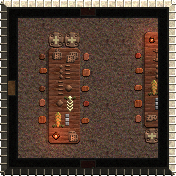Laboratory: Difference between revisions
(Created page with "{{stub}} '''Laboratories''' are infrastructure buildings part of the "knowledge" sub-category. They employ citizens to maintain the amount of knowledge points, otherwise the point will slowly decrease. {{navbar_buildings}} Category:Infrastructure Category:Buildings") |
No edit summary |
||
| Line 1: | Line 1: | ||
{{ | {{Infobox_building | ||
'''Laboratories''' are [[infrastructure]] [[building]]s part of the "knowledge" sub-category. They employ [[citizens]] to maintain the | |title = Laboratory | ||
|image = [[File:lab_preview.png]] | |||
|caption = The "I'm not crazy, I'm eccentric!" location... | |||
|icon = [[File:lab_icon.png]] | |||
|cost = '''Wood:'''<br /> [[File:wood_icon.png]] × 1<br> [[File:wood_icon.png]] + 1 <small>(every 4 tiles)</small><br>'''Stone:'''<br> [[File:stone_icon.png]] × 1<br> [[File:wood_icon.png]] + 1 <small>(every 4 tiles)</small><br>'''Grand:'''<br> [[File:cut_stone_icon.png]] × 2<br> [[File:wood_icon.png]] + 1 <small>(every 4 tiles)</small> | |||
|building_type = [[Infrastructure]] | |||
|subtype = Knowledge | |||
|noise = No | |||
|components = 1 | |||
|expandable = Yes | |||
|comp_req = '''Station:'''<br /> [[File:wood_icon.png]] × 4<br> [[File:furniture_icon.png]] × 3 | |||
|input = | |||
|output = | |||
|percent = | |||
}}'''Laboratories''' are [[infrastructure]] [[building]]s part of the "knowledge" sub-category. They employ [[citizens]] to gain [[knowledge]] points. The points will decrease if laboratories stop functioning. As the player's [[settlement]] grows, more types of buildings, services and technologies will be needed to maintain the ever-increasing population's happiness and production efficiency. Spending knowledge points is the only way to gain access to many important buildings and additional gameplay elements, meaning that laboratories is one of the most important buildings in the game. | |||
If [[library|libraries]] are built, then laboratories can gain even more knowledge points than before. However, it only makes sense to build libraries once many well-functioning laboratories are built first, otherwise the knowledge point boost bonus given by libraries will be meaningless. | |||
==In-game description== | |||
''"In a laboratory, scientists examine nature and gain knowledge that can be spent on technologies, but must also maintain existing knowledge, leading to a cap in the amount of knowledge that can be obtained. If laboratories stop functioning, knowledge will slowly be forgotten.''" | |||
{{navbar_buildings}} | {{navbar_buildings}} | ||
[[Category:Knowledge]] | |||
[[Category:Buildings]] | |||
[[Category:Infrastructure]] | [[Category:Infrastructure]] | ||
Revision as of 12:45, 24 October 2022
| Laboratory | |
|---|---|

| |
| The "I'm not crazy, I'm eccentric!" location... | |
| Building Information | |
| Icon | |
| Building cost | Wood: Stone: Grand: |
| Category | Infrastructure |
| Sub-category | Knowledge |
| Produces noise? | No |
| Components | 1 |
| Expandable? | Yes |
| Component Requirements | Station: |
| Production Information | |
| Input | None |
| Output | None |
Laboratories are infrastructure buildings part of the "knowledge" sub-category. They employ citizens to gain knowledge points. The points will decrease if laboratories stop functioning. As the player's settlement grows, more types of buildings, services and technologies will be needed to maintain the ever-increasing population's happiness and production efficiency. Spending knowledge points is the only way to gain access to many important buildings and additional gameplay elements, meaning that laboratories is one of the most important buildings in the game.
If libraries are built, then laboratories can gain even more knowledge points than before. However, it only makes sense to build libraries once many well-functioning laboratories are built first, otherwise the knowledge point boost bonus given by libraries will be meaningless.
In-game description
"In a laboratory, scientists examine nature and gain knowledge that can be spent on technologies, but must also maintain existing knowledge, leading to a cap in the amount of knowledge that can be obtained. If laboratories stop functioning, knowledge will slowly be forgotten."